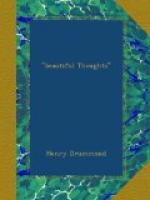December 13th. The humanity of what is called “sudden conversion” has never been insisted on as it deserves. . . . While growth is a slow and gradual process, the change from Death to Life, alike in the natural and spiritual spheres, is the work of the moment. Whatever the conscious hour of the second birth may be—in the case of an adult it is probably defined by the first real victory over sin—it is certain that on biological principles the real turning-point is literally a moment. Natural Law, p. 184.
December 14th. Christ says we must hate life. Now, this does not apply to all life. It is “life in this world” that is to be hated. For life in this world implies conformity to this world. It may not mean pursuing worldly pleasures, or mixing with worldly sets; but a subtler thing than that—a silent deference to worldly opinion; an almost unconscious lowering of religious tone to the level of the worldly-religious world around; a subdued resistance to the soul’s delicate promptings to greater consecration, out of deference to “breadth” or fear of ridicule. These, and such things, are what Christ tells us we must hate. For these things are of the very essence of worldliness. “If any man love the world,” even in this sense, “the love of the Father is not in him.” Natural Law, p. 197.
December 15th. To correspond with the God of Science, the Eternal Unknowable, would be everlasting existence; to correspond with “the true God and Jesus Christ,” is Eternal Life. The quality of the Eternal Life alone makes the heaven; mere everlastingness might be no boon. Even the brief span of the temporal life is too long for those who spend its years in sorrow. Natural Law, p. 220.
December 16th. The relation between the spiritual man and his Environment is, in theological language, a filial relation. With the new Spirit, the filial correspondence, he knows the Father—and this is Life Eternal. This is not only the real relation, but the only possible relation: “Neither knoweth any man the Father save the Son, and he to whomsoever the Son will reveal Him.” And this on purely natural grounds. Natural Law, p. 229.
December 17th. Communion with God—can it be demonstrated in terms of Science that this is a correspondence which will never break? We do not appeal to Science for such a testimony. We have asked for its conception of an Eternal Life; and we have received for answer that Eternal Life would consist in a correspondence which should never cease, with an Environment which should never pass away. And yet what would Science demand of a perfect correspondence that is not met by this, the knowing of god? There is no other correspondence which could satisfy one at least of the conditions. Not one could be named which would not bear on the face of it the mark and pledge of its mortality. But this, to know God, stands alone. Natural Law, p. 220.




